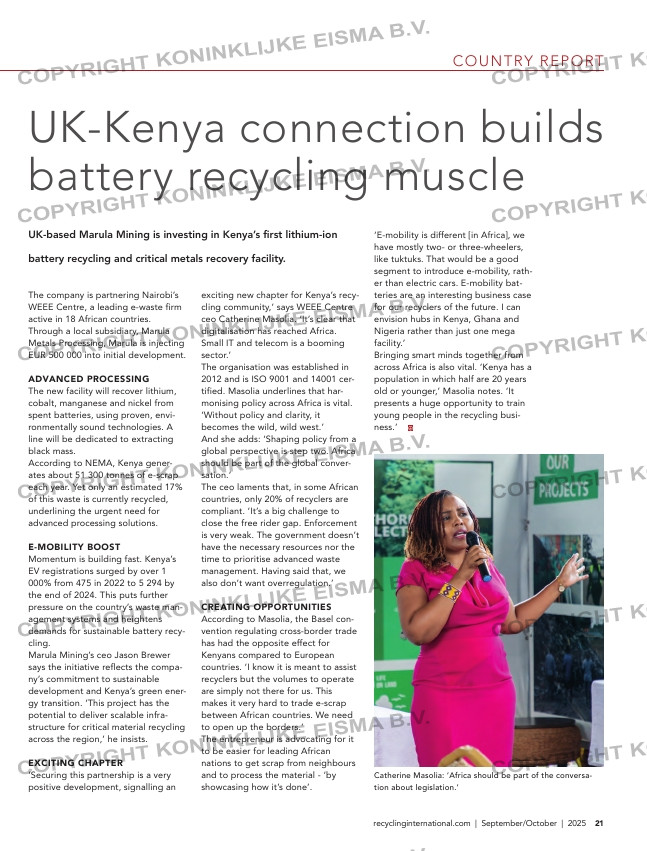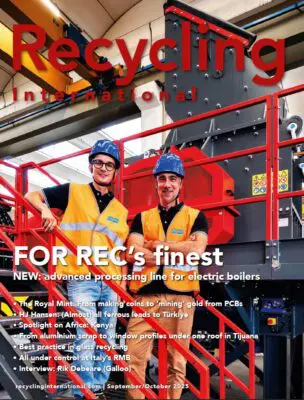Page 21 from: Recycling International September/October 2025

COUNTRY REPORT
21recyclinginternational.com | September/October | 2025
month. That makes TakaTaka
Solutions a great example of Kenya’s
thriving small and medium-sized busi-
ness sector, which employs 80% of
the country’s workforce.
SCRAP BRICKS
Fellow Nairobi-based innovator
Nzambi Matee has made a name for
herself by setting up Gjenge Makers
in 2017. Her company recycles post-
consumer plastics into alternative
building blocks. Above all, Matee is a
social entrepreneur, proud of creating
more than 600 jobs for women and
youth by developing material that
serves communities. ‘If a kid can go
to school and arrive on time because
of the roads I build, I’m happy,’ notes
the recycler, who has a background in
science and engineering. Her compa-
ny has the capacity to treat 25 tonnes
of waste per week, which translates
into 14 000 recycled bricks. The tar-
get is to ramp up to 20 000 next year.
Already, demand for Gjenge Makers’
infrastructure products is far higher.
That’s in large part because these
unique recycled bricks are both stron-
ger and 15% cheaper than their tradi-
tional counterparts. An added benefit
is that they are waterproof.
SO HOW ARE THEY MADE?
• collected plastic scrap enters pre-
processing where it is cleaned,
shredded and separated into differ-
ent types
• the material is heated and mixed
with sand and glass
• colour can also be added if needed
• a hydraulic press breaks the mixture
into different shapes and sizes
• the bricks are moved to a cooling
bath until they reach room tempera-
ture
As well as various types of packaging,
Matee’s team now also treats plastics
from car such as dashboards and
bumpers. As a next step, Gjenge
Makers plans to embrace 3D technol-
ogy. ‘I’d love to make new moulds for
different shapes and products.
Automating our processes would also
help increase the production capacity
and meet growing market demand,’
Matee says.
UK-Kenya connection builds
battery recycling muscle
UK-based Marula Mining is investing in Kenya’s first lithium-ion
battery recycling and critical metals recovery facility.
The company is partnering Nairobi’s
WEEE Centre, a leading e-waste firm
active in 18 African countries.
Through a local subsidiary, Marula
Metals Processing, Marula is injecting
EUR 500 000 into initial development.
ADVANCED PROCESSING
The new facility will recover lithium,
cobalt, manganese and nickel from
spent batteries, using proven, envi-
ronmentally sound technologies. A
line will be dedicated to extracting
black mass.
According to NEMA, Kenya gener-
ates about 51 300 tonnes of e-scrap
each year. Yet only an estimated 17%
of this waste is currently recycled,
underlining the urgent need for
advanced processing solutions.
E-MOBILITY BOOST
Momentum is building fast. Kenya’s
EV registrations surged by over 1
000% from 475 in 2022 to 5 294 by
the end of 2024. This puts further
pressure on the country’s waste man-
agement systems and heightens
demands for sustainable battery recy-
cling.
Marula Mining’s ceo Jason Brewer
says the initiative reflects the compa-
ny’s commitment to sustainable
development and Kenya’s green ener-
gy transition. ‘This project has the
potential to deliver scalable infra-
structure for critical material recycling
across the region,’ he insists.
EXCITING CHAPTER
‘Securing this partnership is a very
positive development, signalling an
exciting new chapter for Kenya’s recy-
cling community,’ says WEEE Centre
ceo Catherine Masolia. ‘It’s clear that
digitalisation has reached Africa.
Small IT and telecom is a booming
sector.’
The organisation was established in
2012 and is ISO 9001 and 14001 cer-
tified. Masolia underlines that har-
monising policy across Africa is vital.
‘Without policy and clarity, it
becomes the wild, wild west.’
And she adds: ‘Shaping policy from a
global perspective is step two. Africa
should be part of the global conver-
sation.’
The ceo laments that, in some African
countries, only 20% of recyclers are
compliant. ‘It’s a big challenge to
close the free rider gap. Enforcement
is very weak. The government doesn’t
have the necessary resources nor the
time to prioritise advanced waste
management. Having said that, we
also don’t want overregulation.’
CREATING OPPORTUNITIES
According to Masolia, the Basel con-
vention regulating cross-border trade
has had the opposite effect for
Kenyans compared to European
countries. ‘I know it is meant to assist
recyclers but the volumes to operate
are simply not there for us. This
makes it very hard to trade e-scrap
between African countries. We need
to open up the borders.’
The entrepreneur is advocating for it
to be easier for leading African
nations to get scrap from neighbours
and to process the material – ‘by
showcasing how it’s done’.
‘E-mobility is different [in Africa], we
have mostly two- or three-wheelers,
like tuktuks. That would be a good
segment to introduce e-mobility, rath-
er than electric cars. E-mobility bat-
teries are an interesting business case
for our recyclers of the future. I can
envision hubs in Kenya, Ghana and
Nigeria rather than just one mega
facility.’
Bringing smart minds together from
across Africa is also vital. ‘Kenya has a
population in which half are 20 years
old or younger,’ Masolia notes. ‘It
presents a huge opportunity to train
young people in the recycling busi-
ness.’
Catherine Masolia: ‘Africa should be part of the conversa-
tion about legislation.’
16-17-19-20-21-22_africa_kenya.indd 21 09-09-2025 09:41



